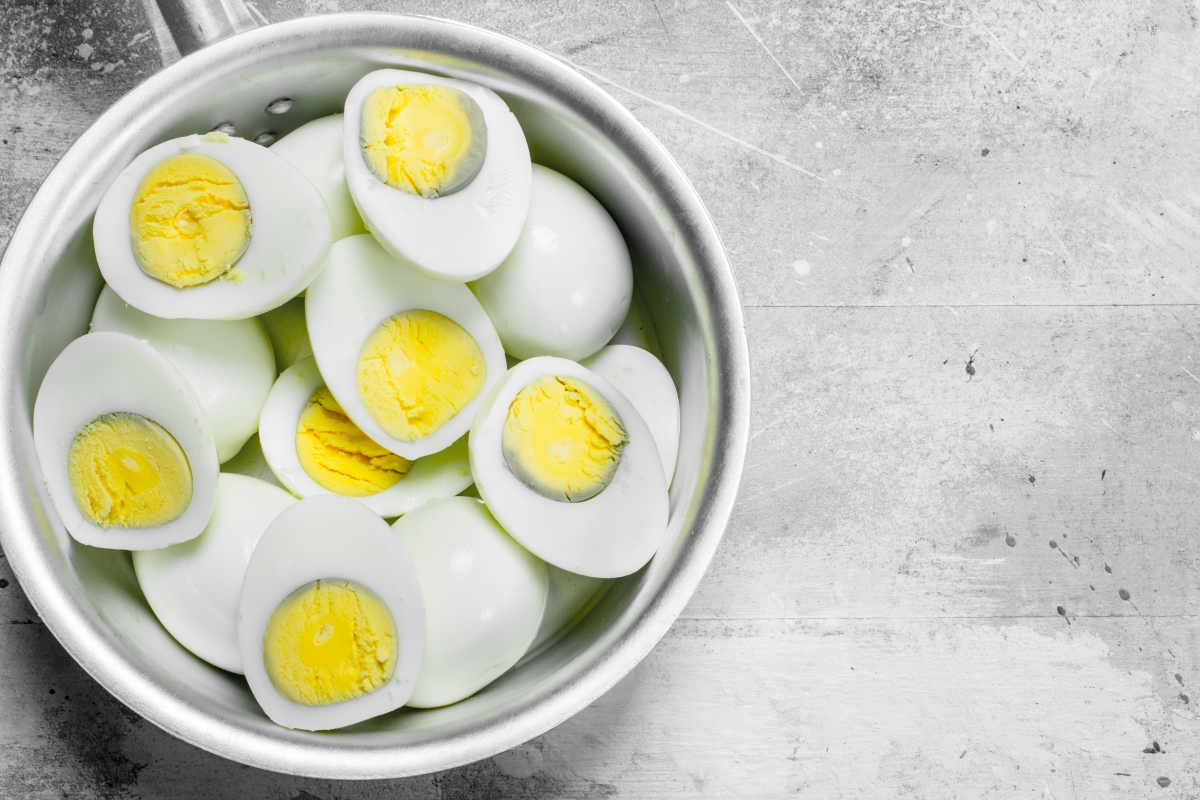Sometimes a dark stripe appears around the yolk after boiling eggs. This is due to a chemical reaction in the hardboiled egg. Do you have to throw the egg away?
- Why Do Overcooked Eggs Have a Grey or Dark Black-green Layer Between the Yolk and the White?
- Is It Safe to Eat an Egg With a Grey or Green Ring Around the Yolk?
- How Do I Know if My Grey Egg is Too Old to Eat?
- What Does the Color of the Yolk Tell Us?
- Can I Tell From the Outside of the Egg if It Will Have a Grey Yolk?
- Do the Storage of the Egg Before Cooking Affect the Color of the Egg?
- How to Avoid the Eggs Turning Grey?
- How Long Can I Keep Boiled Eggs That Are Grey Before Eating Them?
- Is It Healthy to Eat Eggs With Grey Yolk?
- Sources
Why Do Overcooked Eggs Have a Grey or Dark Black-green Layer Between the Yolk and the White?
The discoloration in the egg is caused during the cooking process, by a chemical compound formed when the egg is overcooked or cooked at too high temperature. The egg yolk contains iron and the egg white contains hydrogen sulfide (sulfur), and when these substances combine they produce Ferrous Sulfide (Iron Sulfide) with a black, grey, or dark green color. Sometimes there is only a greenish-gray ring on the surface of the yolk but on really overcooked hard-boiled eggs, larger parts of the yolk can be grey-colored.
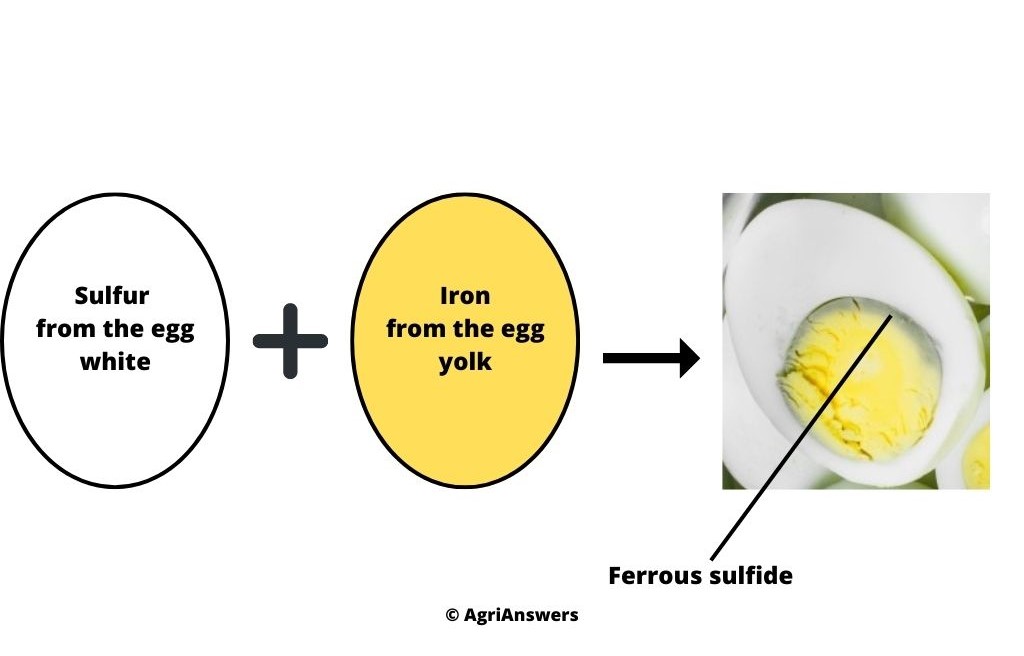
Is It Safe to Eat an Egg With a Grey or Green Ring Around the Yolk?
You think you’ve cooked the perfect hard-boiled egg but when you’re about to serve your egg salad there’s a greenish gray color on the outside of the yolk. Are these signs of spoilage e.g. a rotten egg that will cause severe illness?
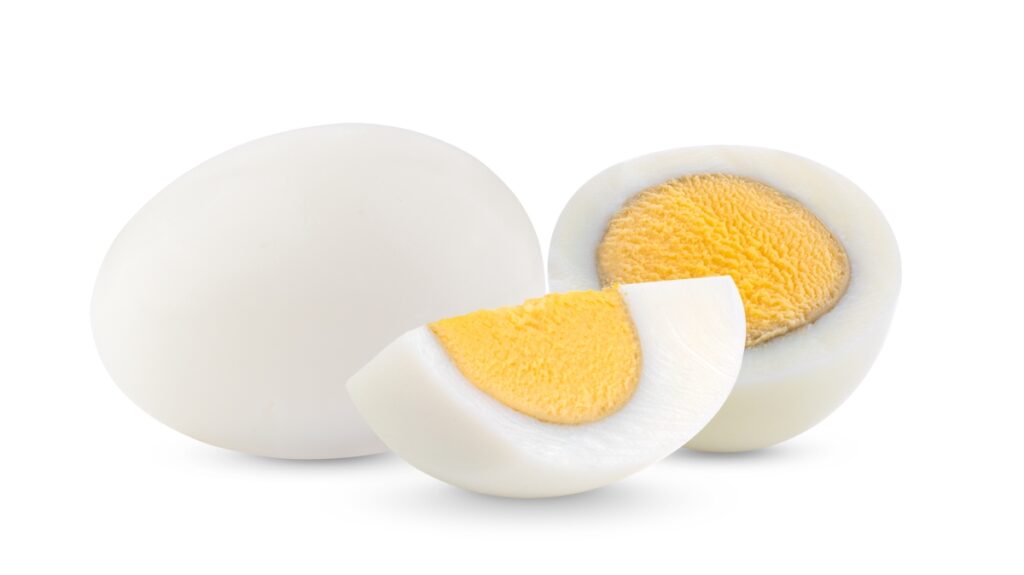
It’s perfectly safe to eat, but it doesn’t look very appetizing. When discoloration forms around the yolk, it is because the egg is well cooked, which also means that the egg has reached a specific temperature in all parts of the egg, thus killing pathogens such as salmonella. It is a lot more dangerous to eat a runny egg without discoloration where there is a risk of food poisoning.
How Do I Know if My Grey Egg is Too Old to Eat?
Egg is a versatile food that is good to have at home. Many people test the freshness of eggs by checking whether they are floating. This test is done on raw eggs before they are cooked. A fresh egg will sink to the bottom and older eggs will float. But floating does not necessarily mean that the egg is inedible. The best way to tell when an egg is inedible is by smelling and tasting it. A bad egg smells and tastes very bad; you shouldn’t eat it whether it is gray-colored or not.

What Does the Color of the Yolk Tell Us?
The color of the yolk can tell you a lot. So next time you eat an egg, look closely at the yolk.
Deep Yellow Color
The hen that laid the egg has probably been free-ranged, eating green plants. This gives the yolk a beautiful deep and strong yellow color.
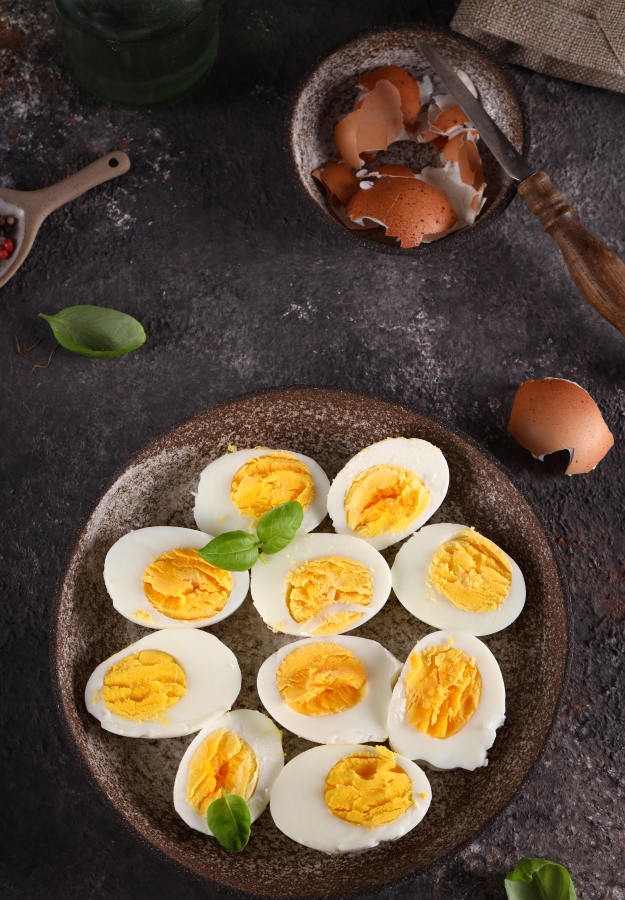
Pale Yellow Color
The hen that laid the egg has probably been kept indoors and eaten commercial feed. This gives the yolk a paler yellow color.
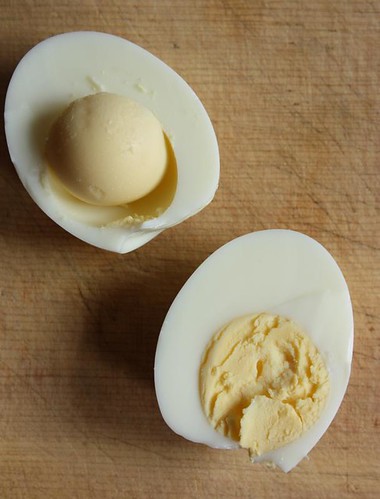
Photo: “perfect-hard-boiled-eggs” by Andrea_Nguyen is licensed under CC BY 2.0.
Grey Egg Yolk
Grey-colored yolk indicates hard-cooked eggs.
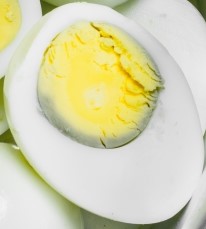
Yellow Creamy Egg Yolk
This suggests soft-boiled eggs, i.e. they are not hard-boiled. There is a risk of e.g. Salmonella if the egg is not pasteurized before cooking.
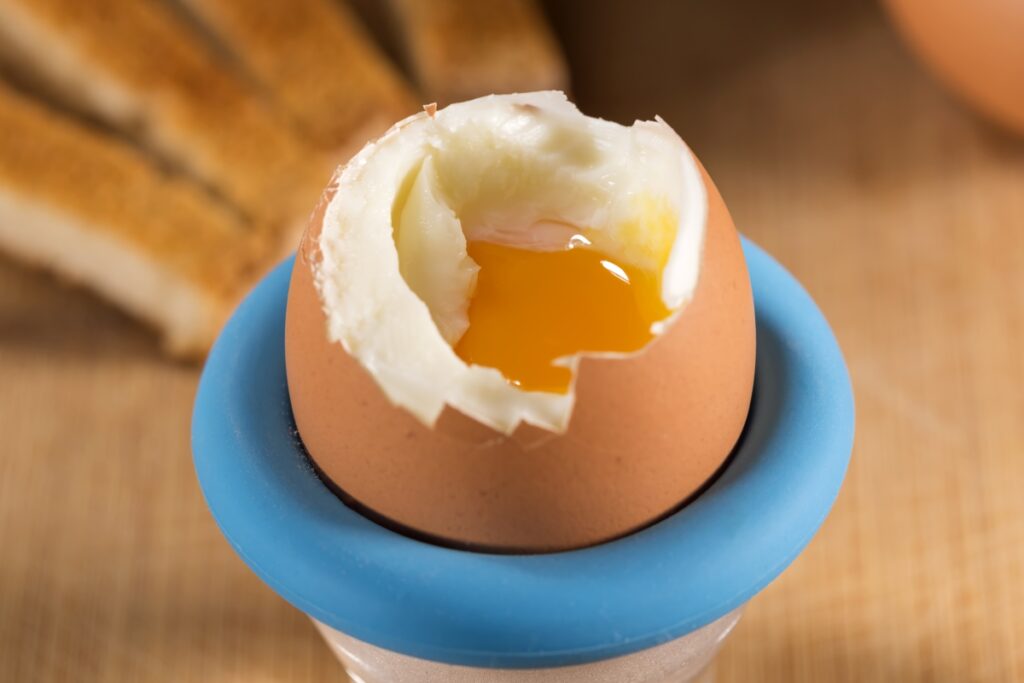
Can I Tell From the Outside of the Egg if It Will Have a Grey Yolk?
No, you cannot tell from the color of the eggshell what the inside of the egg will look like. The shell of the egg can be different colors, for example white, brown, blue, and green, but the inside will always look the same. Different breeds of hens lay eggs with different colored shells.
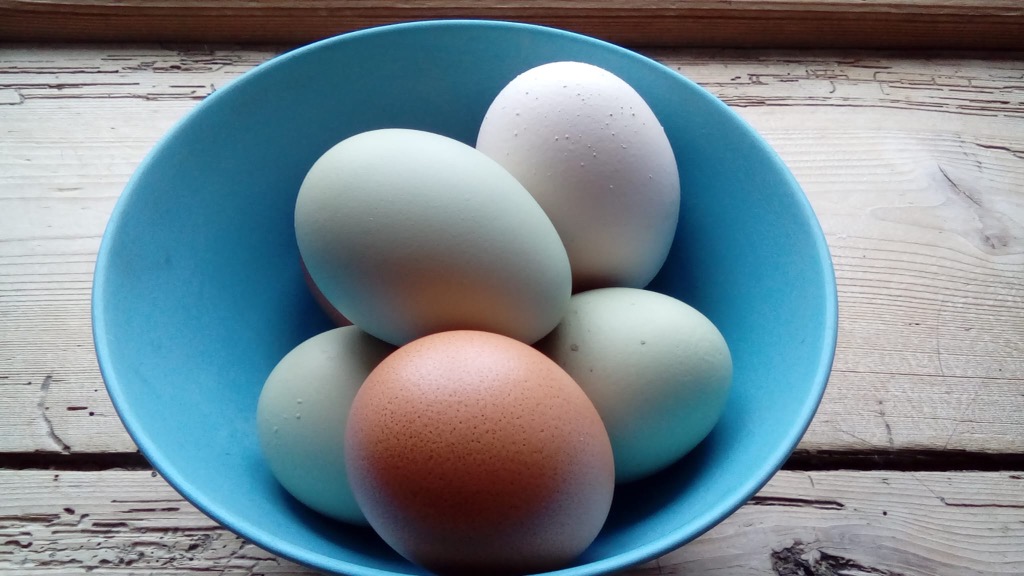
Do the Storage of the Egg Before Cooking Affect the Color of the Egg?
No, it does not. But it is still important that you store your egg correctly so that it will last a long time and not go bad and cause illness. Buy fresh eggs that have been stored in the refrigerator. Open the carton and make sure all the eggs are whole and that there are no cracks or damage to the shell. Then store the eggs in the refrigerator at a temperature of 40° F or below until you are ready to cook them.

Eggs should be stored in the refrigerator to keep them fresh and safe to eat. The best way to store eggs is in their original carton on a shelf in the main part of the refrigerator, rather than in the door. This will help to keep them at a consistent, cool temperature and protect them from getting jostled and cracked. It’s also a good idea to place the eggs in the carton with the pointed end down, as this can help to keep the yolk centered and prevent the egg from drying out.
How to Avoid the Eggs Turning Grey?
By boiling and handling eggs properly, you can avoid discoloration. Follow the steps below for perfect hard-boiled eggs without color change:
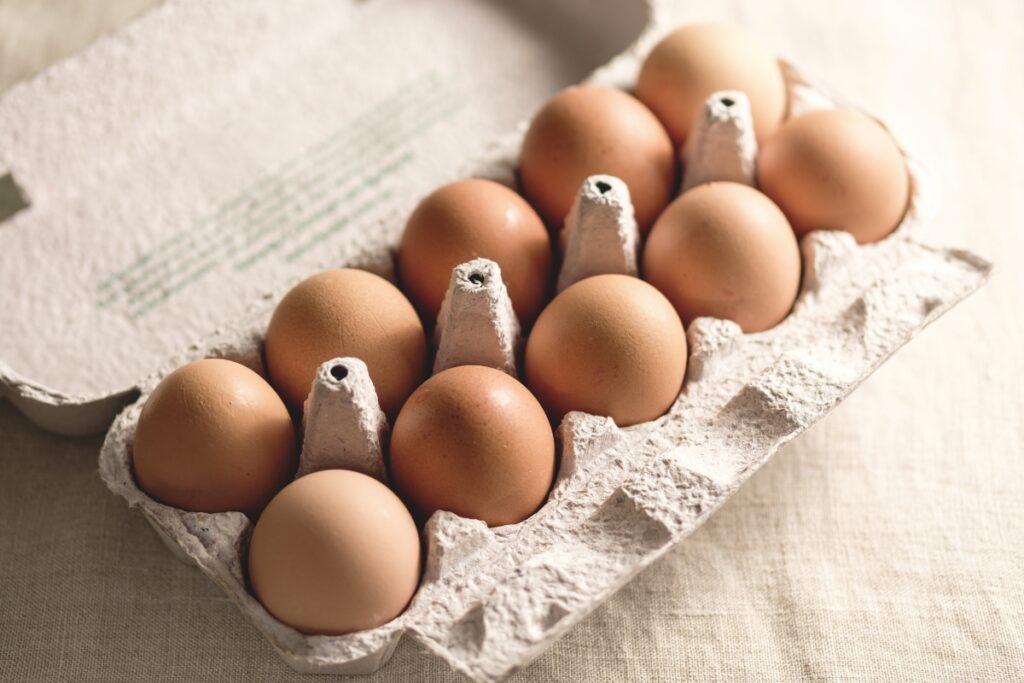
- Choose fresh eggs that have not passed their expiration date.
- Place them in a pan and cover them with cold water. Do not put them in boiling water.
- Bring the water just to a boil over high heat.
- Remove the pan from the heat and put a lid on it.
- Leave medium eggs in the pan with hot water for about 9 minutes (l12 minutes for large eggs). The cooking time is essential to avoid overcooked boiled eggs with a gray tinge.
- Remove the cooking water and eat the eggs immediately or cool them quickly. Eggs should be cooled quickly using one of the following methods:
- rinsing them with cold water
- putting them in an ice bath
- by using a freezer bag
- putting them in a bowl of cold water
- If you are not going to eat the eggs straight away, do not store them at room temperature after cooling. Instead, place the whole eggs in an airtight container and store them in the refrigerator.
I hope this cooking method gives you perfect hardboiled eggs without discoloration.
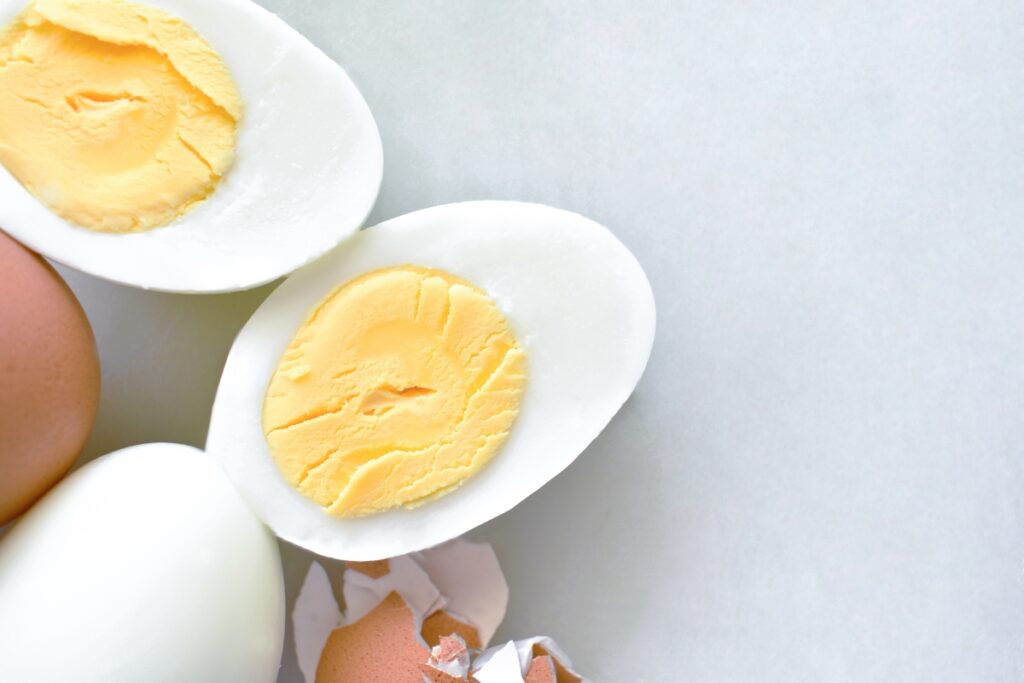
How Long Can I Keep Boiled Eggs That Are Grey Before Eating Them?
Refrigerate the egg quickly after cooking. According to the U.S. Food and Drug Administration, you can then eat a hard-boiled egg (peeled or unpeeled) for up to a week after cooking.
Is It Healthy to Eat Eggs With Grey Yolk?
Yes good news, discolored eggs are just as healthy as regular eggs. According to the United States Department of Agriculture, the US produces more than 113 billion eggs in a year (2019), but is it healthy to eat so many eggs?
Egg Nutrition
Eggs are a remarkable product in many ways – in their convenient package, packed with essential nutrients, a great source of protein, and vitamins. Eggs are packed with protein and other goodies. The yolk provides a real vitamin boost, mainly vitamins A, E, D, and folate – and a dose of beneficial minerals like iron and selenium. What’s more, boiled eggs are a great dish on the dinner table and a handy-packed picnic food or a quick post-workout snack. 12% of the egg is waste (egg shells etc) that cannot be eaten.
| Nutrient (unit) | Per 100 grams of boiled egg |
|---|---|
| Energy (kcal) | 137 |
| Energy (kJ) | 575 |
| Carbohydrates (g) | 0,4 |
| Fat, total (g) | 9,73 |
| Protein (g) | 12,3 |
| Fibrer (g) | 0,0 |
| Water (g) | 76,3 |
| Alcohol (g) | 0,00 |
| Ash (g) | 0,8 |
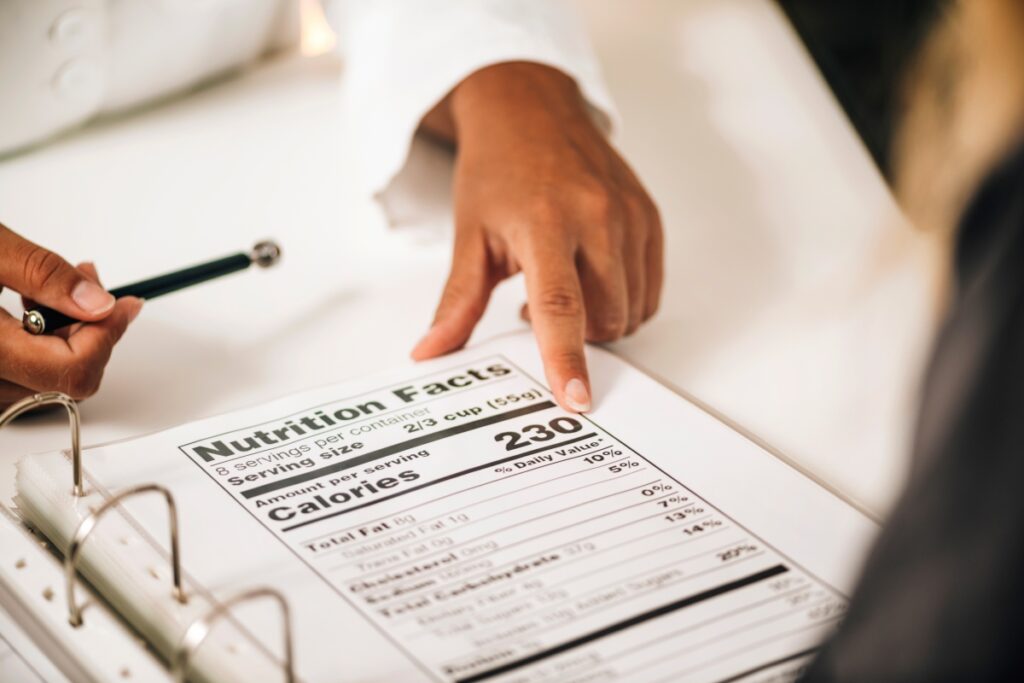
| Vitamin (unit) | Per 100 grams of boiled egg |
|---|---|
| Water-soluble vitamins | |
| Thiamin (mg) | 0,06 |
| Riboflavin (mg) | 0,36 |
| Niacin equivalents (NE/mg) | 3,10 |
| Vitamin B6 (mg) | 0,08 |
| Folate (µg) | 81,5 |
| Vitamin B12 (µg) | 1,18 |
| Vitamin C (mg) | 0,0 |
| Fat-soluble vitamins | |
| Vitamin A (RE/µg) | 233,2 |
| Retinol (µg) | 233,0 |
| Beta-carotene/β-carotene (µg) | 0 |
| Vitamin D (µg) | 3,33 |
| Vitamin E (mg) | 5,6 |
| Vitamin K (µg) | 30,2 |
| Minerals | Per 100 grams of boiled egg |
|---|---|
| Phosphorus, P (mg) | 184 |
| Iodine, I (µg) | 42.0 |
| Iron, Fe (mg) | 1,7 |
| Calcium, Ca (mg) | 52 |
| Potassium, K (mg) | 132 |
| Magnesium, Mg (mg) | 12 |
| Sodium, Na (mg) | 142 |
| Salt, NaCl (g) | 0.4 |
| Selenium, Se (µg) | 22.7 |
| Zinc, Zn (mg) | 1.3 |
Eggs and Cholesterol
Eggs contain cholesterol, but most people can eat several eggs a day without adversely affecting their cholesterol levels. This is because healthy people have a control mechanism that reduces the body’s production of cholesterol when they eat foods containing cholesterol. In people with impaired cholesterol metabolism, cholesterol from food may need to be restricted. In this case, this is something that the health service advises. The amount of cholesterol per 100 grams of eggs is 340.0 mg.
Sources
https://www.fda.gov/food/buy-store-serve-safe-food/what-you-need-know-about-egg-safety
https://www.usda.gov/media/blog/2020/04/14/egg-stat-ic-about-eggs
